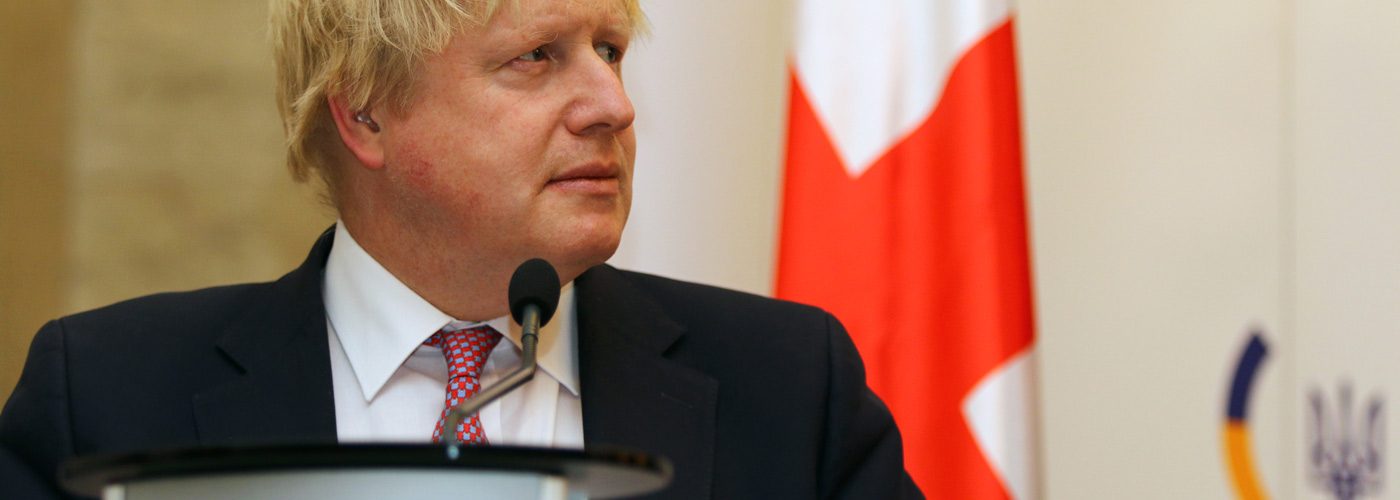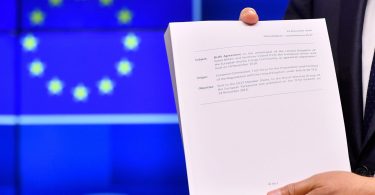This article by Martin Howe QC, Chairman of Lawyers for Britain, appeared in shortened form in the Daily Telegraph on 18 October 2019.
What’s good about Boris Johnson’s revised deal
First, the positives. Boris Johnson’s deal unveiled on Thursday 17 October 2019 is miles better than Theresa May’s ghastly capitulation. First, the Northern Ireland backstop Protocol in the Withdrawal Agreement (WA) has been modified to remove Great Britain from being locked into a vassal-state customs union with the EU until the EU chooses to release us.
Secondly, the Political Declaration (PD) which sets out the future EU-UK relationship has been amended so that it foreshadows a Free Trade Agreement under which the UK will be able to operate its independent trade policy, instead of the UK being locked into the EU’s external customs tariffs. (For our readers, we have uploaded a Political Declaration Versions Comparison which shows the changes made to the Political Declaration since the Theresa May version)
Thirdly, references in the PD to the UK aligning its rules to EU rules have been deleted.
Fourthly, the so-called “level playing field” commitments in the PD have been changed. The previous commitment to shadow the EU rules on competition and state aids in Theresa May’s WA has been replaced with a more open ended commitment not to distort competition.
Fifthly, an important change has been made to the defence cooperation clauses, explicitly making clear the right of the UK to determine how it would respond to any invitation by the EU to participate in joint action in the defence field.
The first four of these changes inter-relate with each other in a beneficial way. Together, they transform the dynamic under which the long term UK-EU agreement will be negotiated. Under the Theresa May (TM) deal, the UK would have been locked into a scenario where we would have been forced to agree to whatever terms the EU chose to impose for the long term relationship, as the only avenue out of the catastrophically damaging whole-UK backstop.
Under this revised draft agreement, the negotiations are firmly based on achieving an FTA which, unlike a customs union, allows each party to conduct their trade policy with third parties independently of each other. Further, unlike under the TM deal, it becomes realistic for the UK to walk away from the long term negotiations with “no deal” at the end of the transition period. This gives real negotiating leverage to hold out against the unacceptable terms which the EU will surely try to impose.
BUT … the negatives
The above are important – very important – positive changes, but the revised WA still contains many severely negative features. This is because the text of the NI backstop Protocol is to be revised, but unfortunately the actual WA text itself, as negotiated and serially capitulated by Theresa May, will be untouched.
The most important and damaging feature which remains is the long term subjection of the UK to rulings by the ECJ. At present, the ECJ is a multinational court in which we jointly participate. After we exit the EU, it will become an entirely foreign court. It will be an organ of the opposite treaty party with whom we may be in dispute, owing no loyalty at all to the UK. It is virtually unheard of in international relations for any sovereign independent state to submit the interpretation of its treaty obligations to the courts of the opposite treaty party, allowing them to be effectively re-written for the benefit of that party.
However, TM’s WA contains a clause (Art.174) which means that the nominally independent arbitration panel set up to decide disputes would have to refer any issues of EU law for decision by the ECJ, and moreover would be bound by the result. Where the dispute concerns such issues, this would reduce the arbitrators to being a post box to send the dispute on to the ECJ and a rubber stamp to formalise the ECJ’s reasons. The ECJ would be the effective decision maker.
This clause was originally imposed by the EU on the desperate former Soviet republics of Ukraine, Georgia and Moldova. It was successfully resisted by Norway and the other EEA States and most recently has been rejected again by Switzerland in the EU’s attempt to impose it as part of a new framework agreement. Dr Carl Baudenbacher, a Swiss lawyer who recently retired as president of the EFTA Court, has said ‘It is absolutely unbelievable that a country like the UK, which was the first country to accept independent courts, would subject itself to this.‘ Indeed, it is hard to understand why the UK which is so much bigger than Switzerland and far less dependent on trade with the EU, should be willing to succumb to this clause.
The clause in the WA would apply long term: for EU citizens’ rights, effectively in perpetuity, or at least for the lifetime of EU citizens in the UK and their children. Further, the revised PD commits the parties to including a similar clause in the long term relationship agreement with the EU, so it would be with us for ever. If level playing field clauses in the long term agreement are modelled on EU law, the clause would bite. It would convert obligations to follow EU laws as they objecively stand, in effect into obligations to follow unpredictable “reinterpretations” of EU laws by the ECJ in the future.
Secondly, the WA would still contain the so-called transition period. It is understood (although this is not reflected in the legal text) that Boris Johnson’s government would not agree to extend this period beyond December 2020. During this period, the UK would be subject to all EU laws, both those that exist now and those that are brought in during that period, but would no longer have a vote or veto.
This situation is highly dangerous for some industries in particular: financial services, who may be subjected to rule changes designed to force business such as Euro derivatives clearing from the City into Continental centres, and our fishing industry who will be vulnerable to further severe damage during the period before they can escape from the Common Fisheries Policy. Against that, it is hard to see what is now the justification for this over elaborate transition period when we are going to change to a free trade relationship with the EU instead of remaining in the customs union.
The third big problem in the WA which has not been addressed is that it imposes financial obligations on the UK which go well beyond the UK’s obligations under international law. The amount of this gratuitous over-payment is generally referred to as “£39bn”. In fact, the obligation is not defined in the WA as an amount of money, but as a series of vague forms of words which are open to interpretation. And in one of her maddest acts of capitulation of many, Theresa May agreed a clause under which the UK’s financial obligations are unilaterally decided upon by the ECJ instead of by a neutral arbitration mechanism. I predict that the eventual liabilities will end up a lot bigger than £39bn.
And this money will be unconditionally payable, whether or not the EU offers the UK a satisfactory long term trade agreement. There is just no linkage.
Fourth, the revised Northern Ireland Protocol would still impose an EU-law based legal regime on NI and create new administrative barriers to trade between GB and NI, albeit that goods imported to NI could avoid being subject to EU tariffs under a complex rebate or exemption system. More fundamentally, the consent mechanism for the continuation of EU laws over NI does not conform with the concept of the consent of both communities under the Belfast (Good Friday) Agreement. We intend to cover these complex issues in greater depth in another article.
So is it overall a good or bad deal?
In very important respects, this deal is much much better than Theresa May’s deal. But using that deal – utterly atrocious from end to end – as a flawed benchmark for comparison greatly flatters the Johnson deal.
If we ask whether is it a good deal compared with the deal which a competent government could have negotiated with the EU, the answer is undoubtedly “no”. The progress which has been made by a determined PM in forcing the EU to reopen the text which they previously insisted could not be reopened is proof that a similarly determined attitude throughout the negotiation process would have yielded much better terms for the UK.
The problem is that it is much more difficult to try to renegotiate an existing text than it would have been to get the right result at the more fluid stages of original negotiation.
The second way to measure whether or not it is a good deal is to test it against the alternative, which is not to have a withdrawal agreement under Article 50 at all, and instead to negotiate our future relationship with the EU after exit. Contrary to some of the misleading terrors being put about regarding a “no deal” exit, there is no legal requirement to have a withdrawal agreement in order to leave the EU, nor does not having a pre-exit agreement prevent immediate negotiations on our future relationship, coupled with short term bridging arrangements to keep trade flowing while talks take place.
On this test, and despite the marked improvements over the disastrous TM deal, the revised deal is still overall a bad deal. It lands us unconditionally with huge financial obligations for nothing concrete in return, beyond the opportunity to negotiate a trade deal which we would be able to negotiate anyway. A UK-EU FTA is one-sidedly beneficial to the EU, given the UK’s huge importation of goods from the EU concentrated in high tariff sectors such as agriculture, cars and clothing.
You can argue that in the sweep of history, paying large sums of money we did not owe will be forgotten and the important thing is to regain our freedom. This is unfortunately a cheque the British people must pay for the negligence of Theresa May.
Of more concern are the longer term negatives which remain in the WA such as saddling ourselves with long term ECJ jurisdiction. I predict that we will have bitter cause to regret such concessions in future years as unpredictable and activist judgments come out from the ECJ, which the UK and our Parliament will have no choice but to obey.
But is the new deal “tolerable”?
But even if the deal is bad, and is worse than a no deal alternative, is it tolerable, in order to prevent Brexit being de-railed altogether?
This question is more political than legal. A significant number of Brexit supporting politicians ultimately voted for the TM deal because they thought that was preferable to the risk of not getting Brexit through at all. I did not criticise their decisions at the time and I do not do so now because I recognise the extremely difficult judgement call they had to wrestle with.
But I remain of the view that that was objectively the wrong call, because it did not fully take account of the crucifying effect of the TM deal on the UK’s ability to negotiate an acceptable future relationship, nor of how difficult it is under international law to get out of a binding treaty obligation which does not have an exit clause. Unfortunately, some were seduced by legal snake oil arguments that various implausible get-out routes existed under the Vienna Convention on the Law of Treaties.
The positive changes to the Northern Ireland Protocol and to the PD described at the beginning of this article demonstrate that it was the right call to reject the TM deal, and that better terms could indeed be obtained – which she never asked for.
Those changes greatly transform the negotiating dynamics for the long term relationship with the EU. The UK will have a real ability to walk away if the terms are unacceptable, which would be a powerful lever in the hands of a Johnson majority government determined to use it.
For example, it will transform the prospects of the fishing industry. Under the TM deal, a vague clause in the PD would have enabled the EU to force the UK into continuing to allow EU boats into UK waters, but the EU will no longer have the leverage to accomplish that.
So I can understand a political judgement that the revised deal is still a bad deal, but is tolerable as a price for the greater prize of the United Kingdom regaining our freedom after Brexit.
But the final hurdle – Parliament
My own preference would have been to by-pass the WA and go to new talks on our future relationship, instead of trying to renegotiate it, for two reasons. (For more detail on how this would work, see How the Next Prime Minister can move on from the Withdrawal Agreement.)
The first reason is that it is very hard to negotiate changes to an existing text where you have to battle for every point. This has proved to be the case. It seems that all the negotiating capital has been used up in cracking open the NI Protocol, and the many bad points in the other parts of the WA have not been addressed.
But there is a second and even more important reason. By law, the UK cannot ratify an Article 50 withdrawal agreement without an implementing Act of Parliament first being passed into law. An implementing Bill has been drafted which is believed to contain at least 175 clauses and multiple schedules.
If there is a “yes” vote in principle to the deal in Parliament on Saturday 19 October 2019, it is far from clear how the government intends to achieve the unprecedented feat of passing such a complex and controversial piece of legislation through both Houses in under two weeks.
But that is not the most important point. Once a Bill is placed before Parliament, the government will have no control over what amendments are tabled and which will be passed by the last-ditch anti-Brexit majority in both Houses. Amendments could be made – for example either for a second referendum, or requiring the government to go back and negotiate changes to the deal – which might turn a just-tolerable deal into a disastrous one.








